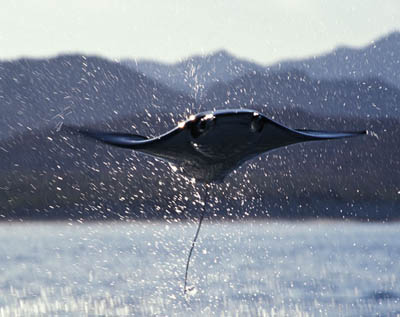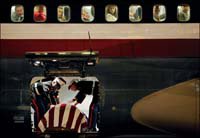Wow. Never has my blog been so fascinatingly informative to me, and never have I had so little time to read it.
PHOTOS AT FLICKR. Sorry, no time to organize or add captions. This is a long post and I don't want to knock all the great guest blogging off the front, so click on the timestamp/permalink for the whole thing. HAPPY NEW YEAR EVERYONE!
Time for some hit and run blogging, drafted offline while
After I blogged on Tuesday evening (Indian time), we ventured into the old city to visit a monastery (Math) there. After listening to the sermon and singing,we met a few of the monastery's cows who had been put inside the goshala off the courtyard for the evening; unfortunately it was too dark to photograph them. They're some of the only cows I've seen so far on this trip. Hyderabad is relatively unencumbered by cattle. As is traditional, we sat in a row on the floor of the monastery's dining hall, and the monks served us dinner on plates sewn together from leaves. In Bengal these plates are made from the leaves of a shal tree, but my cousin brother didn't think these plates were made from shal. The old city's shops were still thickly crowded even after 9 o'clock at night.
The next day I had breakfast twice--once at my uncle and aunt's flat, and once at my cousin brother and sister-in-law's flat, home of the oft-mentioned neice and nephew. My sister-in-law had gone through the trouble of finding rasa-kadamba, one of my favorite Bengali sweets, seeing as how I won't get to Bengal proper for a couple weeks. She also made chow mein (!) and peas kachoris--fried flat bread stuffed with mashed green peas. Mmm. Then we went to the Salar Jung Museum.
Click the Timestamp to read the rest of the post.
It sits on the bank of the river Musi, which looks like it must have once been huge, but is now practically only a stream. The Salar Jungs were the prime ministers of Hyderabad when it was ruled by Nizams, and they traced their roots through the Moguls to an early Muslim from Medina on one side, and Persian royalty on the other. Salar Jung III. who founded the museum and collected the bulk of the art work, died a bachelor in 1949. I found the curation slightly lacking, and annoyingly weaker in the Indian parts than in the western parts, but I was still impressed with antique statuary, Mogul weaponry and brocade, and especially the collection of Indian miniatures. In the middle of the museum is one of those clocks with a figuring that comes out and hits the bell on the hour. A crowd of at least a couple hundred gathered around to see it at three pm, and some tech company has sponsored a video camera and two plasma screens so people can better see the figurines. I was kind of amazed that people would get so excited over a mere mechanical clock assembled in Calcutta of British parts, and felt rather ridiculous waiting in the crowd for the clock to strike. My Dad started singing, "One! Two! Three!" perhaps for my nephew's benefit. I started shushing my dad when suddenly, behind us, I heard a teenage boy's voice, "Four!" My dad:"Five!" Unseen boy:"Six!" And the two of them kept singing through the numbers, like a pair of sesame street muppets, till they hit 30 and the figurine came out. As the pressure of the crowd eased, I turned around to try and find the boy, but he had dissolved back into the crowd of strangers.
In the evening my aunt took us shopping at the alarmingly named, "Wedding Mall." The last time I came to India I didn't really wear saris, so it was fun to actually shop for saris myself--there's a wide counter, with chairs on one side for us, and the salesmen and shelves stacked with saris on the other side. Man, though, the salesmen are pushy. What's intimidating is how carelessly they'll take a two-foot stack of perfectly ironed and folded saris and throw them all open in front of you, until you're facing a mountain of fabric. I feel bad thinking how much work it will be to fold all those saris and put them away--which I suppose is part of the sales trick.
The next morning The Hindu arrived at our hotel with the headlines of the shootings at the Indian Institute of Science in the city of Bangalore, which happens to be next on our itinerary. It was maddening not to be able to get online and read all the news, but perhaps instructive--both The Hindu and the Deccan Chronicle headlined the incidents, and had a couple sidebars on it, but that was about it. Maybe I got a better sense of the proportion of the sad event--or lack thereof--by absorbing it throught the same medium of daily paper that my relatives do, and not through the filter of Google News. My relatives were fairly nonchalant about it. I've heard it observed many times that societies which actually deal with terrorism on a regular basis are in some ways less perturbed by it than the United States is, and this seems to confirm that. Still, it was a bit unnerving to read that the CIA had warned the Indian Intelligence that militant groups would be targetting the software parks of the south, since that's where were headed on Thursday. Also disconcerting to read that the current suspicions lie mainly on Hyderbadis. Oh well, that's life.
The road from Hyderabad proper to HiTec City has many interesting new houses being built off its sides. It's also being widended, providing a dramatic example of eminent domain, Indian style--all over Hyderabad, but especially on that road, you'll see buildings--still occupied--that have had their fronts broken off, the walls exposed, like a doll's house or a diaroma exhibition on interior architecture. The roads are lined with workers finishing the widening and also putting new fronts and facades on these houses, mostly with their bare hands. All over Hyderabad there is construction and roadwork. (In fact, last night we fled our hotel and slept at my Uncle's flat because they start the pounding and drilling all around us at 2 AM!) The scaffolding still gives me the willies---rough polls tied together with ropes. In HiTec City I saw some workers wearing yellow hardhats, but most of the time workers were wandering around in just shorts or lungis---or tied up saris! A lot of the workers are women. I saw many women digging at the ground, filling up a basket with building materials, and then carrying it somewhere on their heads.
After we went to HiTec City we stopped at the Shilparam crafts village, which was having a major fair and vendors from all of India hawking emblematic regional goods. I would pick out what I wanted and then go get my aunt to do the bargaining. It was easy to get carried away and do all my shopping right there, but my Dad reminded us that we have to carry all this stuff all over India for the rest of our trip.
Yesterday I had a more basic, boring Indian adventure--waking up in the middle night with a churning stomach and retching throughout the morning. So I spent yesterday lying in bed with a bottle of oral hydration salt treated water, remembering brimful and her viral musings. I also rewatched Parineeta, which I watched on the plane. (It's pretty good! Better than Devdas, I thought, though I might have been overly entertained by costumes matching my parents' teenage pictures.)
Tonight I'm feeling a little better. On the way here the crowds were INTENSE. Running around Hyderabad in a rented SUV (!!!--but it's a super skinny Qualis, and apparently the only car the hotel had which would fit all of us) that's so full we've got kids on our lap (!!!) without seatbelts (!!!), oftentimes rushing headlong into traffic, I just have to go with the flow and pretend like I'm used to it. Even so, tonight has been nuts. Traffic, air and noise pollution are easily the top three most overwhelming things. When me and my Dad crossed the main road the first time here, we started laughing hysterically when we made it to the other side. I feel like all bicyclists here should be given a Bharat Ratna medal. A couple things I saw on the way--a little Chinese restaurant--a small concrete shack, really--with Guernica--yes, Guernica, by Picasso--elaborately muralled on the side. And on a scooter, two ladies clutching a man--one in full on black purdah, the other made up in a salwar kameez, with flashy gold earrings and her hair fully exposed.
Because I was sick, and because we're travelling during holidays, things are particularly hectic. Probably won't blog until we get to Delhi several days from now. Right now I'm sort of wishing we hadn't put so many cities on the itinerary--my desire to play tourist has rather evaporated now that I'm here with my family. 8 years is a long time not to see relatives, and in the case of my uncle and aunt this is the first quality time (really good quality time) I've ever had with them. There's a phrase in Bengali--mon kamon korche--literally, "how the heart is doing!" or "the heart is yearning"--that seems to already apply. Haven't seen that much of Hyderabad, but I will definitely miss it.
Some notes from the journey that I didn't have time to organize last time: Travelling on Christmas day is a bit depressing, since I feel bad for all the people who would obviously rather be home than working. I tried to tip baristas and the like generously, and wished everyone a very grateful Merry Christmas, but I think I will think twice before arranging my own travel plans on Christmas again. Then again, it's a perpetual economic question--does not purchasing an uncomfortable good or service really help the people providing it? Always hard to tell for sure.
Secondly, I was really amused by how many uncles in the LAX Air India line sent their grown children off to check out the prices on the duty free Johnny Walker. At least four. Thirdly--If you're at the LAX international terminal, eat before you go through security. I totally misunderstood where the restaurants were with respect to security. I saw a sign on the floor above us for Sushi, and was greatly anticipating have a few rolls of avacado sushi on the way to the gate. Turns out, there was no actual food between security and the gate---and of course, it may very well be a month before I get me some avacado sushi.Fourthly--dude, if you're going let your toddler sleep on your shoulder during a flight, for the love of God, do not sit in an aisle seat. This two-year old fell off her sleeping father's shoulder and onto my Dad's leg. Good thing she did fall onto my Dad's leg--it might have been my worse if he hadn't broken her fall. Finally--Air India was late leaving LAX, apparently because of immense congestion in the security line--though not as late as I was afraid they might be--and so our flight from Mumbai to Hyderabad was held up, waiting for us. Amazingly enough, for once I had made it through security in the United States without getting excessively searched. So guess where they decide to go through my baggage? Mumbai. My mother: "Wow, maybe you really do just look suspicious. Perhaps wearing a black tracksuit like a cat burglar didn't help." So by the time we run to our gate, the loudspeaker is calling, "Datta family! Datta family!" and we have our own personal escort armed with a walkie-talkie to appraise the captain of our progress. My mother irritatedly points out to this man that it's not our fault, since it was Air India that was late, to which he replies,"It's not our fault ma'am. It's that bloody Bush! He's so obsessed with terrorists, and it's the Indian people who are suffering." I'm not sure if he meant, "It's the Indian people who actually have to deal with terrorists" (see above) or "It's the Indian people who have to deal with Bush's terror obsession." But even I didn't agree that this was GWB's fault.
HAPPY NEW YEAR EVERYONE!!!!




